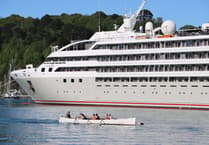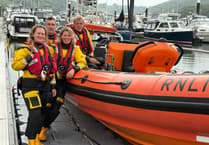More than 100 people boarded a historic paddle steamer in Dartmouth at the weekend for a rare evening cruise up the River Dart.
Aboard the 99-year-old Kingswear Castle for the two-hour trip were both tourists and ship aficionados who enjoyed the breathtaking views, including sailing past the ship’s namesake, Dartmouth’s famous 15th century fort, as well as a family of seals sleeping on a jetty.
Explaining why they had decided to book the trip, Graham and Chris Bennett said the KC held a special significance for them. “I lived in Totnes as a child, and the Kingswear Castle was a real feature then, seeing it go up and down the river when the Reeves’ timber yard was busy,” said Graham, who has also sailed on the PS Waverley (the last seagoing passenger-carrying paddle steamer in the world).
“There’s something about the atmosphere of these boats and the rhythm of the engine that is completely different. The screw on a typical diesel boat cuts its way through the water, whereas the paddles (on a steam ship) just press themselves along and oxygenate the water,” he added.
The couple also noted the high level of craftsmanship and painstaking care that had gone into rebuilding the KC, which is also the UK’s last river-going paddle steamer. Although in regular service, sailing three times a day during the week, Saturday was only the second evening cruise this season, in aid of the vessel’s centenary build appeal and following the first part of the rebuild.
A substantial amount of steel work has so far been done, including replacing all the bulkheads, amounting to about £500,000, with another half a million pounds expected to be spent on the remaining restoration.
This will include replacing the deck forward of the wheelhouse as well as refurbishing the ship’s steam condenser. Once that is completed, the KC should continue in service for another 25 to 30 years.
Chris Phillips, spokesperson for the PS Kingswear Castle Centenary Rebuild Appeal, said he was “very pleased” that 110 passengers had booked to go on the cruise.
Asked why the KC was held in such high esteem, he said: “She is steam powered, which means there’s none of the vibration that you get on a diesel-powered ship.”
The complexity and cost of regularly sailing a steam ship were just two of the reasons why such vessels are not seen in UK waters more often, he explained.
“You can’t just switch on an engine, you’ve got to ‘raise’ steam. You have to clear the ship of ash, maintain the boiler and then you have to fuel the ship – she has to be coaled, which takes time.”




